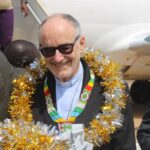South Sudan's English Daily Newspaper
"We Dare where others fear"

By Awan Achiek
South Sudan Journalists for Human Rights, Canada’s largest international media development organization on Thursday trained journalists on fact-checking tools to combat fakes, misinformation and hate speech.
The one-day training attended by 20 journalists from different media houses aims to empower them with fact-checking tools and strategies to combat dis-information, miss-information and hate speech.
The project, funded by Global Affairs, aims to increase access to accurate information to strengthen constructive public dialogue on peace and security, human rights and governance.
John Kon Kelei, Country Representative of Dallaire Institute urged journalists to pay attention to the practical part on how to fact-check the information in a bid to present accurate information.
“We need to spread information that is accurate, and many people in our very fragile societies are going against each other because of the misinformation. I hope these are the opportunities that will make our journalists know more on which information that you think is rightful to convey, and how you convey it, and do you have accurate information,” Kon said.
“Misinformation has put us in a lot of problems in South Sudan. I hope some of you may agree with us. You might also see that in the public, there is a kind of less attention being paid for our own personal activities,” he added
For her part, Mary Ajith Goch, Project Manager of South Sudan Journalists for Human Rights, said the training will impact journalists with skills and experience to browse the tools to fact-check news stories before publishing them.
“Misinformation and disinformation is a real concern in South Sudan. You have been seeing it throughout your daily work. On social media nowdays you wake up to stories that if you don’t actually read them well and fact-check, you will believe everything,” Ajith said.
“And you can even get stress out of the stories that don’t have anything to do with you, but because of the exaggeration that is in those stories,” she added.
Meanwhile, John Arok, Representative of Defy Hate Now, said the training will empower journalists with the latest tools to tackle disinformation through information verification.
“It is the mark of a good journalist to fact-check information before sharing it with others. I urge all of you to take this practical training on fact-checking tools seriously,” Arok said.





